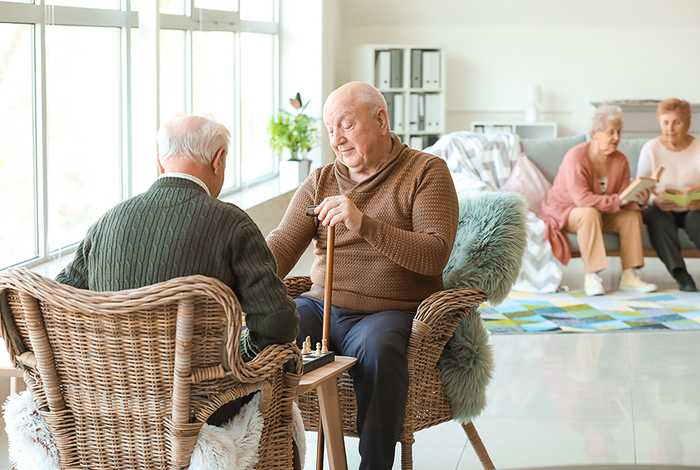Posted by Rachel Bashford
What does palliative care involve?
If you're wondering about palliative care, here's all the important information you need to know.

This article will give you the latest on:
- What palliative care is and who might need it.
- How to control symptoms and get help.
- Talking it through.
- Available support.
- Future preparation.
What is palliative care?
Palliative care, also referred to as ‘end of life’ care, is a whole-person approach to caring for someone who has a significant life-limiting condition. This approach not only includes pain and symptom management, but also emotional and psychological support for the person affected, alongside their loved ones.
The primary aim of this type of care is to control pain, reduce symptoms and extend life for as long as possible. Many see the inclusion of loved ones within palliative care as one of the major benefits of this process.
A team of healthcare professionals, including doctors and nurses, are usually the providers of palliative care in the UK. These professionals should be trained in palliative care delivery and may co-ordinate care with other agencies, such as social care.
Palliative or end of life care will only be recommended when all other care avenues have been exhausted and healthcare professionals, along with the person affected and their loved ones, have come to the decision that this is the best pathway. It’s probably true to say that every palliative journey will follow a different timeframe, in relation to the individual’s situation.
2022 data from The Office for Health Improvement and Disparities reveals that in England from September 2021 to August 2022, 126,014 people were cared for near the end of their life in a care home, around 23.4% of all people who died. Additionally, there are people living at home receiving palliative care that would increase this number.
The graph below illustrates people who were cared for and their care pathway. A proportion of people move into care homes to receive more expansive care if they feel this can’t be delivered at home or in their current setting.

Source: Office for Health Improvement and Disparities.
In this NHS video, palliative care is explained in more detail, including personal stories about the end of life journey and experience from loved ones.
There are 5 principles of palliative care which aim to guide the process and make it more beneficial for those involved. It’s believed that palliative care should:
- View death as natural while affirming the value of life.
- Follow the natural patterns of death so it occurs at the right time.
- Deliver correct pain relief and reduce symptoms.
- Combine the emotional, physical and spiritual care elements.
- Create a support system so people can make their own choices.
Symptom control and support
Managing symptoms and reducing distress are key aspects of palliative care. Achieving the best quality of life possible for the person and their loved ones is vital in forming a constructive experience. Healthcare practitioners in the UK are trained to pay close attention to the needs and wishes of the person involved, so symptom management is a significant part of this process.
Training providers, such as Gold Standards Framework, work with doctors, nurses and a wide range of professionals to develop a greater understanding of the processes of palliative care and how to best support those going through this stage in life.
The symptoms experienced are going to be slightly different for each individual. Some may undergo feelings of nausea, vomiting, breathlessness or fatigue, amongst other issues. Not everyone has these symptoms, but doctors or nurses may ask about them as they are quite common.
In terms of pain management, pain relief will be administered by professionals involved in palliative care support. Often, this begins with paracetamol and may then move on to stronger medication during the palliative journey.
As a process of symptom management, this NHS information page gives a clear explanation of what may happen so that people can understand the palliative approach as a whole.
In this Social Institute for Care and Excellence (SCIE) video, pain management strategies during palliative care are explored in more depth, including a wide variety of therapies.
Talking about palliative care
Starting a conversation about such a big topic can be daunting. But making the choice to talk is a huge step and one that can open the doors of communication to create a better understanding of the palliative journey.
At first, people may not be comfortable discussing life-limiting conditions and the prospect of what might be next on the horizon. Perhaps the words themselves are proving awkward to say or it could just be challenging to find a way in to the subject.
This SCIE video reveals how mindful word choices can ensure a more productive and helpful discussion around end of life care. Originally, this clip was for healthcare professionals, but it’s also for family members or loved ones who are looking for a starting point into a chat about palliative care.
Available support
Locating the right supportive services to help you or a loved one open up about end of life care and what it means can be a really strong starting point. There are some experienced professional agencies and charities all around the four nations that are available for expert insight, helpful advice and practical strategies.
Some charities, like Hospice UK, are designed to help improve quality of life for people going through palliative care. This short video enables viewers to take a quick peak into what it’s like for someone on this journey.
Hospice UK are situated around the country and work with other healthcare practitioners and agencies to support those affected by end of life care and beyond.
Another charity involved in end of life care is Marie Curie who offer a wide range of support for those affected and their family or friends. They provide a free support line with trained teams who can offer advice or simply listen when people need to talk through all aspects of palliative care or related topics.
Undergoing a life-limiting illness can be an incredibly intense time for both the patient and their loved ones. It’s often difficult to find the time to locate appropriate support and to make sure that the help offered is the right type for individual circumstances.
Every person on the palliative care journey will want personalised advice that suits their needs. That’s why it’s important to research well and choose the provider that most reflects those requirements. Your health team will be able to give you lots of information to help identify suitable agencies or groups.
Preparing for the future
When it’s a good time, thinking about the future and what plans you would like put in place can be a proactive step forward. You can ensure that your wishes are clear so that everything happens according to your arrangements.
Sharing plans with everyone involved can also make things easier for your loved ones when they need to take action, as they will already know your wishes. There are a whole host of different ways to express your plans for the future, including making a Will or creating bucket lists and memory boxes for special people.
Thinking about your future medical care is a really important consideration. You can take part in a ReSPECT process, where you discuss your wishes and document them in a ReSPECT (Recommended Summary Plan for Emergency Care and Treatment). This would be completed in conversation with your health team, so that everyone is aware of your specific medical requests.
You may want to think about where you would like to be cared for if you begin on the palliative care journey. Talking this through with family members can help begin the process so you can find the right place for you.
Some people also like to put their affairs into order through a power of attorney document. This can enable your loved ones (when the time is right for you) to take charge and make appropriate choices for your circumstances in the future.
This article will help you find out more around this topic.
How can I search for care homes near me that offer palliative care?
It couldn't be simpler. Just go to the Autumna homepage. Select an area you would like to search – for example Surrey. Then in the ‘Additional Filters’ select 'Care Given' scroll down to 'Palliative Care' and click ‘Search Again’.
And that's it. You'll get a shortlist of care homes in Surrey all of which have told us they provide palliative care.

To make it easier for you to find care homes in your area that provide palliative, or end-of-life care, here’s some pre-filtered results:
Care homes offering palliative care in Bedfordshire, Berkshire, Bristol and Buckinghamshire.
Care homes offering palliative care in Cambridgeshire, Cheshire, Cornwall and Cumbria.
Care homes offering palliative care in Derbyshire, Devon, Dorset and Durham.
Care homes offering palliative care in East Sussex and Essex.
Care homes offering palliative care in Gloucestershire, Greater London and Greater Manchester.
Care homes offering palliative care in Hampshire, Herefordshire and Hertfordshire.
Care homes offering palliative care in The Isle of Wight
Care homes offering palliative care in Kent.
Care homes offering palliative care in Lancashire, Leicestershire, Lincolnshire and London.
Care homes offering palliative care in Merseyside.
Care homes offering palliative care in Norfolk, Northamptonshire, North Yorkshire and Nottinghamshire.
Care homes offering palliative care in Oxfordshire.
Care homes offering palliative care in Rutland.
Care homes offering palliative care in Shropshire, Somerset, South Yorkshire, Staffordshire, Suffolk and Surrey.
Care homes offering palliative care in Tyne and Wear.
Care homes offering palliative care in Warwickshire, West Midlands, West Sussex, West Yorkshire, Wiltshire and Worcestershire.
For more information about end-of-life care, or in fact for any sort of care home and later living advice, email us here: info@autumna.co.uk or call our Advice Line on 01892 335 330. Our phone line is open seven days a week. (8:30am - 5:30pm Mon-Fri, 10am - 5pm Sat, 10am - 4pm Sun).
Other articles to read
Autumna Blog

Older Persons Care Advice
Care options for the elderly: What is right for you?
October 17th, 2025
Discover care options for the elderly that fit your needs, from home support to residential care, helping you plan confidently for the years ahead.

Older Persons Care Advice
Are next of kin responsible for care home fees
October 17th, 2025
Find out the truth about care costs. Are next of kin responsible for paying care home fees? Learn who pays, exceptions, and how to plan ahead.

Older Persons Care Advice
How to find a live in carer
October 15th, 2025
Discover how to find a live in carer who’s skilled, trustworthy and compatible, with practical tips on choosing the right support for your needs.
Frequently Asked Questions
Palliative care is sometimes refered to as 'end of life care' and is a whole-person approach to caring for someone with a life-limiting condition.
Palliative care includes pain and symptom management as well as emotional and psychological support for the person affected.
ReSPECT stands for Recommended Summary Plan for Emergency Care and Treatment.






